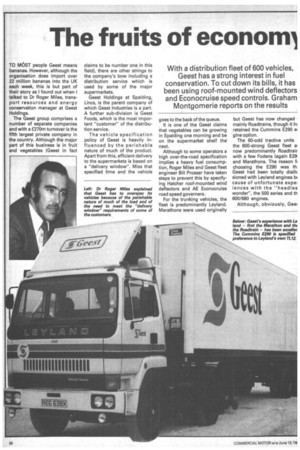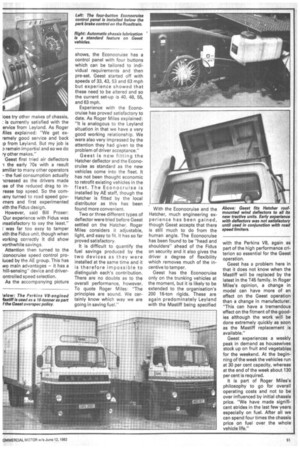The fruits of economl
Page 44

Page 47

If you've noticed an error in this article please click here to report it so we can fix it.
With a distribution fleet of 600 vehicles, Geest has a strong interest in fuel conservation. To cut down its bills, it has been using roof-mounted wind deflectors and Econocruise speed controls. Graham Montgomerie reports on the results
TO MOST people Geest means bananas. However, although the organisation does import over 22 million bananas into the UK each week, this is but part of their story as I found out when I talked to Dr Roger Miles, transport resources and energy conservation manager at Geest Holdings.
The Geest group comprises a number of separate companies and with a £270m turnover is the fifth largest private company in the country. Although the major part of this business is in fruit and vegetables (Geest in fact claims to be number one in this field), there are other strings to the company's bow including a distribution service which is used by some of the major supermarkets.
Geest Holdings at Spalding, Lincs, is the parent company of which Geest Industries is a part. A further sub-division is Geest Foods, which is the most important "customer" of the distribution service.
The vehicle specification policy of Geest is heavily influenced by the perishable nature of much of the product. Apart from this, efficient delivery to the supermarkets is based on a "delivery window". Miss that specified time and the vehicle goes to the back of the queue.
It is one of the Geest claims that vegetables can be growing in Spalding one morning and be on the supermarket shelf the next.
Although to some operators a high over-the-road specification implies a heavy fuel consumption, Roger Miles and Geest fleet engineer Bill Prosser have taken steps to prevent this by specifying Hatcher roof-mounted wind deflectors and AE Econocruise road speed governers.• For the trunking vehicles, the fleet is predominantly Leyland. Marathons were used originally
but Geest has now changed • mainly Roadtrains, though it hi retained the Cummins E290 ei gine option.
The 60-odd tractive units the 600-strong Geest fleet al now predominantly Roadtrair with a few Fodens (again E291 and Marathons. The reason fi choosing the E290 was th. Geest had been totally disillt sioned with Leyland engines bi cause of unfortunate expel iences with the "headles wonder", the 500 series and th 600/680 engines.
Although, obviously, Gee:
Oes try other makes of chassis, : is currently satisfied with the ervice from Leyland. As Roger Ailes explained: "We get exremely good service and back lp from Leyland. But my job is 3 remain impartial and so we do ry other makes."
Geest first tried air deflectors 1 the early 70s with a result amiliar to many other operators the fuel consumption actually ',creased as the drivers made ise of the reduced drag to inrease top speed. So the com'any turned to road speed govTners and first experimented with the Fidus design.
However, said Bill Proser: Our experience with Fidus was insatisfactory to say the least."
was far too easy to tamper vith the Fidus unit, though when vorking correctly it did show vorthwhile savings.
Attention then turned to the iconocruise speed control proluced by the AE group. This has wo main advantages — it has a hill-sensing" device and driver'ontrolled speed selection.
As the accompanying picture
shows, the Econocruise has a control panel with four buttons which can be tailored to individual requirements and then pre-set. Geest started off with speeds of 33, 43, 53 and 63 mph but experience showed that these need to be altered and so the current set-up is 40, 48, 55, and 63 mph.
Experience with the Econocruise has proved satisfactory to date. As Roger Miles explained: "It is analogous to the Leyland situation in that we have a very good working relationship. We were also very impressed by the attention they had given to the problem of driver acceptance."
Geest is now fitting the Hatcher deflector and the Econocruise as standard as the new vehicles come into the fleet. It has not been thought economic to retrofit existing vehicles in the fleet. The Econocruise is installed by AE staff, though the Hatcher is fitted by the local distributor as this has been found more convenient.
Two or three different types of deflector were tried before Geest settled on the Hatcher. Roger Miles considers it adjustable, light, and easy to fit. It has so far proved satisfactory.
It is difficult to quantify the fuel savings produced by the two devices as they were installed at the same time and it is therefore impossible to distinguish each's contribution. There are no doubts as to the overall performance, however. To quote Roger Miles: "The principles are sound. We certainly know which way we are going in saving fuel." With the Econocruise and the Hatcher, much engineering experience has been gained, though Geest accepts that there is still much to do from the human angle. The Econocruise has been found to be "head and shoulders" ahead of the Fidus on security and it also gives the driver a degree of flexibility which removes much of the incentive to tamper.
Geest has the Econocruise only on the trunking vehicles at the moment, but it is likely to be extended to the organisation's 200 16-ton rigids. These are again predominately Leyland with the Mastiff being specified with the Perkins V8, again as part of the high performance criterion so essential for the Geest operation.
Geest has a problem here in that it does not know when the Mastiff will be replaced by the latest in the T45 family. In Roger Miles's opinion, a change in model can have more of an effect on the Geest operation than a change in manufacturer. "This can have a tremendous effect on the fitment of the goodies although the work will be done extremely quickly as soon as the Mastiff replacement is available."
Geest experiences a weekly peak in demand as housewives stock up on fruit and vegetables for the weekend. At the beginning of the week the vehicles run at 30 per cent capacity, whereas at the end of the week about 130 per cent is required.
It is part of Roger Miles's philosophy to go for overall operating costs and not to be over influenced by initial chassis price. "We have made significant strides in the last few years especially on fuel. After all we can spend four times the chassis price on fuel over the whole vehicle life."






















































